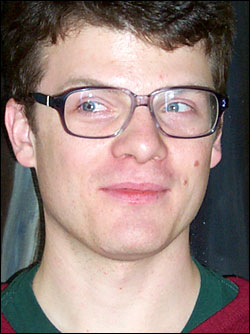Charles darwin might have had a major role in composer Herbert Bergel’s new rock opera, but his part was, um, transformed.
“I was reading Charles Darwin’s [research journal] Voyage of the Beagle because I was traveling the same route along the coast of western South America and I got this idea that I would write a musical version of his book,” says Bergel. “Then I met these Norwegian girls, and they told me these stories about their roommate, Fredrik, and somehow in my mind Charles Darwin was supplanted by Fredrik, and eventually it turned into this thing about these Norwegian roommates who go on this sea journey. Now Charles Darwin is a sock puppet.”
Writer/director Nikki Appino had an equally roundabout way of approaching her latest piece.
“The real genesis of it was a lot of personal tragedy a couple of years agoa convergence of death, betrayal, fires,” she laughs. “All kinds of things that happened to me in a little 30-day period. And it started me thinking about the apocalypse, and then apocalypse theory according to Judeo-Christian thought and how it seems like every 50 or 60 years they calculate when the world is gonna end.”
Now the show is about “Dec. 31, 1999, and three people [who] are dealing with the death of a loved one.”
Whether they prove to be artistic triumphs, noble failures, or some engagingly impenetrable in-betweenBergel’s The Voyage of the Beagle (opening Saturday, May 10 at the Little Theatre, 206-219-3161) and Appino’s Project X: Before the Comet Comes (opening Wednesday, May 7 at the Empty Space Theatre, 206-547-7500) prove that you can still forge something original in a town where more than one arts venue is desperately treading water. Bergel and Appino represent the best of what Seattle’s theater scene has always prided itself on and what will keep it from sinking into apathy: idiosyncratic minds given space to explorewith a kind of disciplined abandonthe joy of creating something new.
At one hour and 15 minutes, Beagle is the longest of the half-dozen musical stories Bergel has creatednone of which is anything you could compare to Oklahoma! His last, Herbert Matthews Goes to the Sierra, was a bouncy, completely sung half-hour about a real-life New York Times journalist and his fateful encounter with Fidel Castro.
The 30-year-old composer, who laughs after every one of his ingenuous interview responses, appreciates traditional musicals but is more inspired by the loose aesthetics of “indie-rock music, where you don’t even have to be able to play an instrument as long as you have an idea.”
His own training? The Nebraskan majored in Spanish and English in college and, aside from junior-high band, “had a couple of guitar lessons when I was 15, from this guy who tried to sell me these Australian bank bonds and convince me there were pyramids on the surface of Venus. I was like, ‘That’s not worth $15 every half-hour.’ So I quit.”
Bergel’s self-taught adventurousness shouldn’t obscure the discipline of his deceptively carefree efforts, which sound like Harry Nilsson or Randy Newman dabbling in Sub Pop territory: quirky, almost nostalgic storytelling that rocks happily without getting lost in indie ironies.
“There’s a lack of offensiveness about the things that I write,” he says carefully. “I like to write things about people who seem like people I would like to know. I’m more into how everyday people deal with everyday types of things.”
Confronted with the notion that Norwegians with Darwin sock puppets aren’t exactly everyday, he pauses, reconsiders, then laughs, “Maybe not.”
Appino is fond of absurdities, too. A one-time acting student of Stella Adler (“I had to wear a skirt and character shoesit wasn’t a good fit”), she became a devoted pupil of experimental theater artist Anne Bogart at N.Y.U., whom she “followed around like a puppy” until shaping her own theater worldview: Her Seattle company, House of Dames, began as a multidisciplined cabaret in the early ’90s and went on to make its name doing what Appino calls “big weird theater.”
Like Bergel, Appino spreads several weeks of rehearsal out over a year of workshops, asking actors (Project X includes Hedwig‘s Nick Garrison) to join her in a process of illuminating “subtle and subtextual things” with singular subject manner. Her last effort, Invisible Ink, was a lush, often obtuse but fairly hypnotic, head-tripping musing about enigmatic WWI temptress Mata Hari; Project X, while more linear in nature, is using live piano accompaniment and video screens of late-night info-babble to look at how we deal with imminent grief.
Audiences, she says, become a part of that process, something that rewards anyone willing to take a chance on the different kind of diversion she offers.
“I think they have to dial in,” she notes. “They’re asked to go on this ride, and it’s a not a traditional ride, and as such, you need to join with it. And I think, hopefully, that has the potential to have impactbecause maybe it can deposit you in a different place than where you started out.”
Bergel, who’s in his show playing “this old sea captain [who] is also the guitar player” (and in a wheelchair), agrees but aims more for the let’s-put-on-a-show exhilaration that original theater can induce.
“I want people to get out of it the sense that you can just make things,” he says. “None of us are singers, and there are several people in this show who haven’t been onstage since they were small children. And they’re singing and dancing. And I think it works because there’s a sort of gentleness. I just get to sit there in a wheelchair and watch these people take these remarkable risks.”








